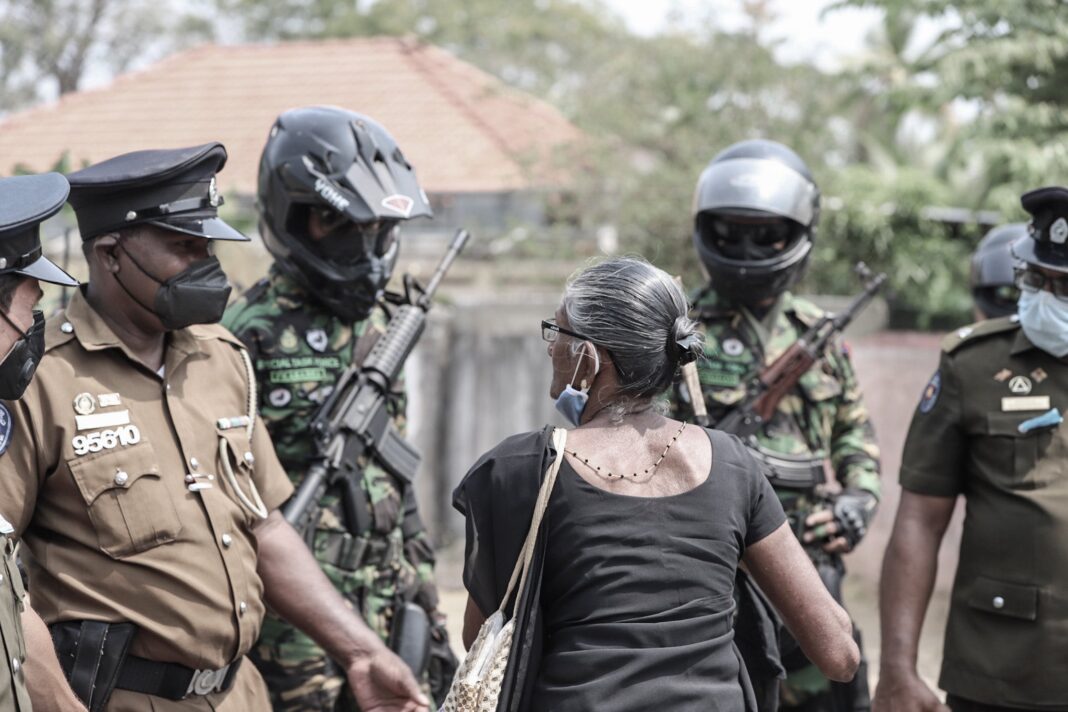Image: Tamils face continues surveillance and harassment in Sri Lanka.
The real stand of the JVP as recently articulated by its General-Secretary Tilvin Silva, arguably the second most powerful person in the country after JVP-NPP leader and President AKD, reveals that the new administration may inadvertently trigger a spike in Tamil separatism.
Thanks to a well-regarded columnist, we can now see the JVP hasn’t come a long way in its backward views on the island’s longest-standing political problem. (https://groundviews.org/2024/10/20/waiting-for-a-democratic-opposition/).
Tilvin Silva’s views cannot be described as ‘racist’ but might qualify for another classification in Lenin’s lexicon, namely ‘social chauvinist’, i.e., socialist in words/form, chauvinist in policy/content.
“…But the issue is, as we have asserted for a long time, while these problems [land matters, broken roads, poverty] are still there, the Northern political leaders who always refrained from resolving those problems [of the common people], used for the purpose of their power, stories (kathanthara”) such as this 13 (“oya dahathuna”), devolution of power (“balaya bedaganeema”) etc. But we well know, since we have gone to the North, that the people on the ground do not want 13; the person on the ground does not need devolution of power (“balaya bedeema”); they want land and water for cultivation, a price for their produce, a place to sell, a school, a hospital—that’s what they desire…”
(https://www.youtube.com/watch?v=Gunr5FEg3QU, minute 51-52)
What the veteran General-Secretary of the JVP, which drives the NPP or determines its strategic parameters, has done here is the following:
(A) Delete the definition of the problem as the Tamil Ethnonational or Nationalities Question, reducing it to a combination of a language gap, postwar reconstruction, development needs and administrative decentralisation.
(B) Reject the existing 13th amendment, with no suitable alternative for the effective, centripetal devolution of power.
(C) Delete the dimension of political power-sharing, of the devolution of power (“balaya bedeema”) to the provincial-level, from any solution/settlement.
Globally, except in the case of colonial/external occupation (e.g., Palestine), almost nowhere is self-determination to the point of an independent state accepted as legitimate.
In several cases the measure of self-rule stretches to federalism but for the most part, ethno-federalism is rejected, from Indonesia and the Philippines through Iraq and Syria, to France. What is generally adopted as a solution is regional/provincial autonomy within either a unitary framework (China, Vietnam) or one that is undefined but non-federal (South Africa), or incorporates some federal features but isn’t fully, formally federal (Spain).
In Sri Lanka, after an impossible push-pull between North (federalism) and South (centralised unitary state) the needle of negotiations finally settled on semi-autonomous Provincial Councils, constitutionally created by the 13th amendment as per the Indo-Sri Lanka Accord.
Tilvin Silva’s line delegitimises the entire post-1983 policy discourse and evolution of four decades. He seeks to roll-back the discussion and broad consensus on provincial devolution/semi-autonomy as the solution to the Tamil Question.
For Tilvin:
- There is no Tamil ethnonational question; instead, there is a set of mundane material issues faced by the common Tamil people “on the ground”.
- There is no cross-class Tamil nationality or ethnonational community experiencing specific problems to do with collective identity, collective political rights and irreducible political space.
- There are only socioeconomic issues.
- The solution is the old ‘decentralisation and development’ formula (i.e., Gotabaya Rajapaksa in a red shirt).
- The liberal/left-liberal contention that the JVP would not have taken to arms on an ultranationalist basis as it did in in the 1980s except as response to the UNP’s post-July ‘83 frameup and proscription, is superficially credible but hardly irrefutable.
- The JVP launched an armed insurrection in 1971 against a popular Government it helped elect a year before, when the party had hardly been framed and banned.
- If the JVP General-Secretary’s current stand against devolution in principle (“balaya bedeema”) –not because of Indian provenance or patronage–is so pronounced 40 years on, it is highly probable that the JVP and its constituency would have been ‘triggered’; roused to such rage as to be unable to resist the temptation of armed revolt against post-1983 provincial devolution even if the party had been a perfectly legal organisation as in 1971.
- Denouncing him as separatist for his defence of Lenin’s doctrine of self-determination, the JVP murdered Colombo University’s radical-leftist student leader Daya Pathirana in late-1986, well before the airdrop/Indo-Lanka Accord.
- 13A remains as inescapable, imperative baseline for negotiation, because of the intractable deadlock between those who want to move beyond 13A and those who wish to go below it; those who think it offers too little and others who think it offers too much.
Tilvin’s rejection of 13A/ ‘power-sharing’ signals dilution/deletion of large-unit territorial devolution, reactivating Tamil separatism.
Excerpts from an linger article by Dr Dayan Jayatilleka published in the Daily FT
